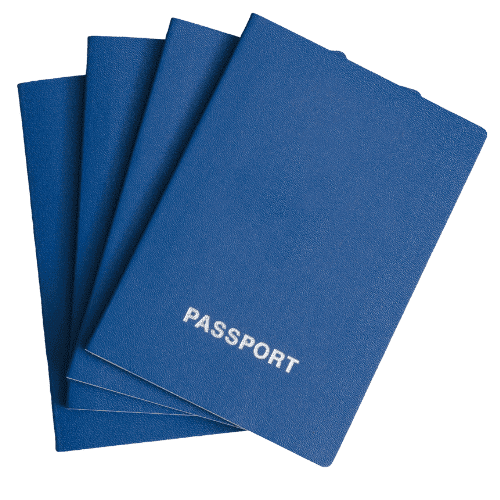Are you a US citizen?
I have some good news… and some bad news for you.
Let me start with the bad.
Americans are the only people in the world who have to pay taxes on their worldwide income, file an annual tax return, and submit additional paperwork to their government no matter where they live in the world.
Some Americans think that living overseas gets them off the hook when it comes to tax and reporting obligations, but this couldn’t be further from the truth.
If you are a US citizen or resident, you need to file your taxes every year, no matter what.
Even if you no longer live in the United States.
Beyond giving up your US citizenship, there is no way to fully exit the US tax system.
Ready for the good news? There are 100% legal ways for US persons (citizens and residents of the United States) to go offshore, reduce their taxes, protect their money, and build their wealth.
While some believe that it’s impossible to save money by going offshore, you do have options.
Yes, US citizens have a very unique set of circumstances that require more compliance, more paperwork, and much more planning to get the benefits that others take for granted, but it is not impossible to go offshore as a US citizen and reap the benefits of that choice.
You simply have to play by the rules.
The US government has a track record of pulling the carpet out from under the feet of people who have legally accumulated wealth offshore or who are operating their businesses overseas. But if you create the right strategy, you will not only increase your ability to protect your assets and lower your taxes but also enhance your personal lifestyle while growing your wealth and opportunities overseas.
If you want to build a sense of freedom and get out of the single-minded American lifestyle, you should strongly consider taking yourself and your business offshore.
But be prepared.
This will require thorough financial planning and expert advice.
Successfully Go Offshore as a US Citizen
Assess Your Goals and Options
As a US citizen, you need to know your end goals just as much as you need to understand your unique circumstances and the tools available to you to create a life of freedom offshore.
Execute Your Offshore Strategy
Once you have a plan in place, execute it before the laws change, the second residence program you were planning on goes away, the cost for that second passport doubles or taxes go up.
Report, Report, Report!
Even if you can totally eliminate your taxes by going offshore, as long as you are a US citizen, you will need to report all your offshore activity: bank accounts, businesses, and more.
Warning!
Going offshore isn’t for people who want to squirrel away money or who think they are smarter than the system and believe they can ‘cheat’ their way to paying no tax.
If you’re here because you’re looking to hide money like you’re some kind of Wolf of Wall Street, you’re in the wrong place. Oh, and the 70s are over.
We live in an era of transparency in which you can save money, protect it, and build your wealth. You’ll just have to report it all to the United States.
WHO HAS TO PAY US TAX?
The first step to understanding how to go offshore as a US person is to understand who is subject to US tax obligations in the first place. There is more than one way to fall into the US tax net!
You can qualify as a US person in one of four ways.
LET US CREATE YOUR HOLISTIC OFFSHORE PLAN
- US Citizens
It doesn’t matter if you’re a dual citizen; if you have US citizenship, you could have 99 other citizenships, and you would still be treated as a US citizen for tax purposes. Merely having a second passport is not a get-out-of-jail-free card. Being a dual citizen potentially allows you to renounce and no longer be a US citizen – if you’re willing to make that trade-off. At that point, you can get out of filing and paying obligations, but a US citizen is a US citizen. And US citizens must report and pay taxes.
- Other US Taxpayers
This includes US Green Card Holders, people on immigrant visas, and those permanently residing in the US.
- People who spend a lot of time in the US
People who fail what’s called “the substantial presence test” have to pay US taxes. For example, I had a guy come to me who was sucked into the tax net for a couple of years because he had spent a bunch of time on a ship that was docked in the US. He wasn’t even American.
- People who make an election to be taxed as a US person
I’ve actually run into one case where a guy might be better off doing that, but 99.9% of the time, you would never want to be taxed as a US person.
If you fall under any of those criteria, you are required to file and pay taxes to the IRS. So, if you are one of these people, how can you go offshore and ease some of the tax burdens?
OFFSHORE TAXES FOR US CITIZENS
Here at Nomad Capitalist, we’ve probably heard of every single misconception related to tax optimization and going offshore that there is.
One of the more notable ones is that US citizens don’t get any benefits from going offshore.
That’s simply not true.
There are multiple benefits that US citizens can get by moving themselves and their businesses overseas.
Just think about the kinds of tax that you pay if you’re a tax resident in the US: income tax, state tax, Social Security and Medicare tax, plus city tax in many instances.
By moving overseas (and with proper planning), you can eliminate city and state taxes, as well as Social Security and Medicare taxes. These will be replaced by the local tax, of course, but if you play your cards right, these will be less than what you were paying back ‘at home’.
It’s very reasonable to expect to pay between 0% and 10% in taxes in total when you take the leap and move offshore.
But before we can look at the various tax-saving strategies available to US citizens who go offshore, it is important to understand the main disadvantage that US citizens face compared to basically everyone else in the world: citizenship-based taxation.
WHAT IS CITIZENSHIP-BASED TAXATION?
US citizens are at a disadvantage when going offshore and this is why: As long as you are a US citizen, you will always be a US tax resident.
The US is virtually the only country in the world that requires US persons to file and pay taxes on their worldwide income no matter where they live. In most countries (i.e., Canada, the UK, Australia, Tajikistan, etc.), you often pay tax on your worldwide income if you live in the country.
But with some planning, these folks can leave their country and be done.
If you are Irish and live in Ireland, you will need to pay tax on your worldwide income. You are living in Ireland and using their services, so they claim the right to tax your investment income from Cambodia just the same as your employment income from Ireland.
But if you leave Ireland and take the proper steps to leave its tax system as well, you are done. As long as you do not have Irish-source income, Ireland will not tax you. When you are gone, your tax obligations are gone as well.
US Citizens have no way out.
Thanks to citizenship-based taxation, US citizens must keep ‘phoning home’ like some sort of a permanent college student.
Suppose you’re a US citizen and you live in Ireland. In that case, the US would still have jurisdiction over that income in Ireland, as well as your income in Cambodia, and the income you make anywhere else.
The United States does not care about where you live, they only care about your citizenship.
If you are a US citizen, you are liable to pay tax on your worldwide income. Always.
People often hear the phrase “worldwide taxation for residents of Ireland” and think that is the same thing. The difference is that nonresidents of Ireland, Canada, Australia, etc., can get out of the system. “Always” does not apply to their situation.
There may be hurdles to jump over to get out of the system (countries like Australia like to make it really difficult), and I predict that you’ll see more countries follow the US in citizenship-based taxation in the future; but for now, these folks have a way out.
They can set up a tax residence elsewhere and leave. But for US citizens, the United States is their permanent tax residence.
Oddly, this can occasionally come in handy in an increasingly transparent offshore tax world. For example, you wouldn’t have to worry about setting up a new tax residence if you’re a perpetual traveler visiting 20 countries per year.
But most of the time, permanent US tax residence is a nuisance, to say the least.
GET ACTIONABLE TIPS FOR REDUCING TAXES AND BUILDING FREEDOM OVERSEAS
Sign up for our Weekly Rundown packed with hand-picked insights on global citizenship, offshore tax planning, and new places to diversify. Plus, instant alerts on key global shifts.
HOW AMERICANS CAN SAVE MONEY ON TAXES BY MOVING OVERSEAS
While you can never fully leave the US tax system while maintaining your US citizenship, US citizens living overseas do get a few advantages compared to their compatriots at home.
Whether you choose to settle down in a country with some form of taxation or opt to live the life of a perpetual traveler, some US citizens can manage to pay tax rates in the single digits thanks to a little something called the Foreign Earned Income Exclusion (FEIE).
If you qualify for the FEIE, you can exclude roughly $110,000 (adjusted annually for inflation) of earned income from taxation every year. Double that if you’re married and filing jointly.
For the tax year 2021, the FEIE amount is $108,700.
Currently, the income tax rate in the US caps out at 37%, so qualifying for the exclusion is key to helping you optimize your tax rates.
To claim it, you must fulfill a variety of criteria. For example, you must spend at least 330 days outside of the US in a single tax year.
While you can go just about anywhere but the US during this time, there are a few places that don’t count toward your 330 days.
For instance, any time spent in Cuba, North Korea, or Antarctica will not count toward the exclusion.
Qualifying for the FEIE is not about setting up a home somewhere else, it’s simply about staying out of the US (and this small list of other countries and territories).
There are also special rules about what you can exclude. For example, only active income earned outside of the United States qualifies for the exclusion. Passive income from investments will receive no such relief.
For instance, people who invest in things like cryptocurrency or have trading profits or capital gains are going to have a harder time reducing their taxes – even if they go offshore. There are ways that they can mitigate their taxes, but it’s more difficult.
And the FEIE only applies to foreign-earned income. If you have invested in a US company or own US real estate, going overseas will not change your tax obligations on those investments. Even if you were a nonresident alien who lived outside the US, you would still be taxed by the US on that income because it is derived from investments on US soil.
For a deeper look at the Foreign Earned Income Exclusion and its various requirements, be sure to read our ultimate guide.
Another benefit that US citizens overseas can take advantage of is the foreign housing credit. If you rent or own a home overseas, you can qualify for even more tax relief.
Purchasing foreign real estate is something we commonly recommend here at Nomad Capitalist. Not only are their great investment opportunities overseas but in many instances, purchasing real estate in another country can also lead to a second residence or citizenship as well as other offshore opportunities and diversification strategies.
The added tax relief through the foreign housing credit is just a small cherry on top of all the benefits of foreign real estate.
(And as long as you don’t generate any income from it, you can use that home and won’t have to report it to the US government.) But back to the tax benefits of going offshore for US citizens…
US citizens can also benefit from foreign tax credits.
I’ve heard people say they’re going to live in Paris, but since they have really high taxes in France, they assume they’ll be paying around 89% of their income in taxes.
It doesn’t work like that.
There are treaties and credits in place so that you aren’t going to have to pay twice. Although there are some cases where double taxation does become a reality – whether it’s on actively earned income or on passive income – there are a lot of IRS rules that generally prevent this predicament.
However, there are countries and situations where the rules and treaties of the IRS do not match up with foreign systems. This is where you could really get stuck, so be aware of the tax situation you’re jumping into before you take the leap anywhere offshore.
Finally, depending on whether you own a business or how your income is structured, US citizens can potentially eliminate their Medicare and Social Security taxes by going offshore.
In most cases, you can also avoid state income tax depending on which state you come from. It just takes proper planning.
The bottom line is that you can earn some money tax-free by moving overseas.
In general, if you create a proper structure, you can use the FEIE and these other tax benefits of going offshore to reduce your US tax burden, possibly to zero.
And that’s exactly what you want to achieve by going offshore.
WHAT’S GILTI AND WHY IS PLANNING SO IMPORTANT?
If you’re a US business owner, tax planning is paramount.
Until just a few years ago, you could defer all income tax by keeping funds in a foreign corporation.
However, the Trump tax reform has made tax deferment very difficult, if not impossible.
This is due, in large part, to GILTI.
The Global Intangible Low-Taxed Income (GILTI) tax law completely changed the game for US companies with foreign profit, incentivizing companies to return to the US by charging tax on intangible assets held offshore by US citizens.
Essentially, the more money you make, the more compliance costs you’ll face.
High-net-worth individuals have suffered the most.
For many successful entrepreneurs living offshore, GILTI was the deciding factor in their choice to renounce their US citizenship.
But most people can still enjoy low-tax benefits offshore without renouncing, living in a country that doesn’t tax them, and incorporating in a country that doesn’t tax them either.
Then, they only have to pay what tax remains on the ‘US side’ of the equation.
You will need a strategic and holistic plan to optimize your taxes this way. You cannot simply move to a place like France that taxes its residents heavily and expect to see tax benefits.
You have to go where you’re treated best.
Going from the US to another high-tax country is just like jumping from one frying pan to another.
And even if you move somewhere with tax incentives and exclusions like Spain or Portugal, you’ll still have to do loads of tax planning.
But if you are making high seven or eight figures, you can afford to do this and still come out ahead.
If your income is lower and you still want to optimize your tax rate by going offshore, your number of lifestyle choices will be limited.
However, there are still strategies that work.
But you have to understand that US Citizens are at a disadvantage because of the laws that are in place. Laws change all the time, and usually not in your favor.
Not in the West, at least.
And many other tax optimization techniques that worked in the past don’t work at all anymore.
If you choose to remain a US citizen and want to lower your taxes by going offshore, two things are for certain:
- You will be paying at least some tax to the US government.
- With laws changing this rapidly, you need offshore professionals on your side.
LET US CREATE YOUR
HOLISTIC OFFSHORE PLAN
Reporting and compliance burdens
Unfortunately, the burdens of US citizenship do not end with taxation.
Just as US citizens cannot run away from being tax residents of the US, they cannot run away from the reporting and compliance obligations of US citizenship.
In fact, in many cases, going offshore will increase these obligations rather than reduce or eliminate them as you can do with taxes.
Several years ago, the US set up the Foreign Account Tax Compliance Act (FATCA). This act requires all banks, financial institutions, and Foreign Financial Institutions (FFIs) around the world to report all US persons who use their services to the IRS. Banks and financial institutions throughout the world use US indicia to determine whether you are a US person and whether or not they need to report your account.
So, besides tax, US citizens have tons of paperwork to deal with on an annual basis. If you have a tax preparer in your corner who understands offshore, this can easily be managed.
But you need the right expat tax service. And you need to personally understand what is required of you if you take your business and life offshore.
The bottom line?
Whatever it is you’re doing overseas, you have to report it.
The two exceptions are privately owned real estate in a foreign country and precious metals that are vaulted outside of the banking system.
Other than that, everything else is reportable.
Here is a non-exclusive list of compliance rules that you must follow as a US citizen with any offshore dealings. And you really don’t want to skip this section; penalties for failing to comply can be tens or hundreds of thousands of dollars:
1. FBAR OR FORM 8938
Don’t be alarmed by the name. It is simply an abbreviation of ‘Report of Foreign Bank and Financial Accounts.’
Essentially, all US citizens must report every single one of their bank accounts, anywhere in the world, to the US government – annually. You also have to report if you have an interest in a foreign trust or if you’ve invested in a foreign corporation.
There are steep penalties for failing to do this. For example, the IRS can seize up to half of the money in the accounts if you don’t report them, or they could even send you to jail.
It really is quite serious, so don’t forget (or avoid) this reporting requirement. The deadline for this is April 15th.
If you have an offshore bank account, you need to read this guide to the FBAR.
2. FORMS 5471, 1120F, AND OTHERS
There are so many forms to keep track of that we have developed a comprehensive checklist for our clients to ensure we miss nothing.
That’s because missing a seemingly insignificant form could inflict a penalty of $25,000 or even more.
We, along with our network of accountants and expat and business tax preparers, help our clients with these all the time.
You can go overseas and set up a foreign company that you can use to mitigate, reduce, and defer your taxation depending on the situation, but you’ll need to report that.
If you have an interest in certain US companies, you may have to file a form. If you’re using an offshore company with business interests in the US – not even necessarily selling, but some kind of on-the-ground presence in the US – you may have to file a different form for that.
You can read more about Form 5471 and how to report ownership or involvement in a foreign corporation here.
3. FCPA
The Foreign Corrupt Practices Act (FCPA) affects those US citizens who do business abroad.
If you’re simply selling goods online, this won’t be an issue. But if you’re doing deals in other countries, the US subjects its citizens and their companies to its laws on bribery.
Essentially, it says that bribery is illegal, and under no circumstance must you engage in anything that they’ve defined to be an act of bribery.
So far so good, right? We don’t want to bribe people.
However, this might be problematic in countries, where people require ‘bribes’ to get things done.
So, you’ll be at a clear disadvantage as a US citizen when you have to comply with the FCPA.
4. OFAC
The Office of Foreign Assets Control (OFAC) is a government agency that manages all sanctions that are placed by the US on foreign countries, entities, and individuals.
They have a list of said countries, entities, and individuals with whom you, a US citizen, cannot do business.
You can’t even do business if you live in the country in question. As long as you’re a US citizen, you cannot touch anything or anyone on OFAC’s list.
Of course, most of us will never do business with the Syrians or the Sudanese, or some Russian oligarch, but it’s just another thing that US citizens must be aware of.
We’ve given you a quick taste of some of the compliance and reporting rules that affect US citizens but rest assured, this is not an exhaustive list.
There are plenty of other compliance and reporting requirements, far too many to list here. But for most of us, none of these will be an issue.
The cost of staying in compliance with the ever-changing US laws, just because you happen to be born in the US is what we call the ‘US Citizen Tax’.
As a US citizen, the US government and its agencies will follow you wherever you go.
Make no mistake – they will hold you accountable to their laws.
All US citizens need a second passport
If you ask us, every US citizen should have a second passport as part of their financial planning and strategy.
The requirements of compliance and reporting have become so draconian that many feel that the only solution is to leave the system entirely and give up their citizenship, ASAP.
Not so fast.
You need a second passport before you can get rid of your first one.
And you’ll need proper tax planning as well. Renouncing your citizenship comes with one final tax return plus the renunciation fee, and possibly the exit tax too.
There is a lot to consider.
If you’ve been on the blog or YouTube channel long enough, you probably know that I’ve renounced my US citizenship.
It wasn’t just for tax reasons, either. I didn’t think it was fair to be hounded and held accountable for all of these rules and laws, even if I wasn’t living in the United States.
It was an emotional burden because I wanted to be compliant and it was such a pain to keep track of all the bank accounts, businesses, investments, and so on. So, I finally took the plunge.
It was a liberating experience and the best choice for me at that time, and to this day.
But what about you?
If you want the benefits of obtaining a second passport as a US citizen, there are two basic approaches:
PLAN A – RELINQUISH AND THRIVE
First, Plan A:
Is this what you’re thinking?
“I make $5 million and I want to keep every penny of it. The compliance sounds ridiculous and I definitely don’t want to be under anyone’s thumb.”
You want to eliminate all of the paperwork and the hassle, not to mention lower your tax rate to 0%.
Or, you want to protect your foreign spouse from being dragged into reporting taxes to the IRS.
If so, you need to get that second passport and then renounce your US citizenship.
The route toward a second passport that our clients most often use is citizenship by investment. The cheapest program starts at $100,000 and prices go up from there.
But there are other options, as well, such as “fast-track naturalization”, standard naturalization, and citizenship by descent.
When you obtain that second passport, you can then relinquish your US citizenship for good. You’ll never be bothered about US taxes again.
Here at Nomad Capitalist, we specialize in helping people find the best passport (or passports) for their situation.
Obtaining second citizenship gives you an important planning tool that has an excellent return on investment.
PLAN B – A SECOND PASSPORT FOR INSURANCE
Plan B is a little softer and it’s for those who maybe don’t mind paying 10-12% in tax.
It’s also for those who aren’t making enough money to justify renouncing their US citizenship and just want an insurance policy at this point.
Even if you remain a US citizen for now, which is perfectly normal and the option most of our clients take, it sure is nice to have options.
Our philosophy here at Nomad Capitalist is that you always need a safe haven.
The US government has shown time and time again that it believes it controls your life, no matter where you live.
So, what do you do then? Obtain your second passport and stick to your US one too.
Even though you’re kind of the ‘enemy’ if you’re living abroad in the times of ‘America First, no one is going to come and take your US citizenship away.
We can help you choose a country where you can obtain your second passport and have a safety net.
Then, at any moment, you can pull the lever and get out; walk into an embassy, and relinquish your US citizenship before they pass the next crazy law.
PUERTO RICO: THE OFFSHORE HAVEN CLOSEST TO HOME
US citizens always have the option of moving to their ‘very own’ tax haven – Puerto Rico.
In this unincorporated US territory, you can expect to pay between 0% and 4% tax.
But it’s not as easy as simply showing up in Puerto Rico. It takes meticulous financial planning to reap the rewards.
As with every program that offers many financial incentives to move yourself and your business to a particular jurisdiction, there are many strings attached.
You have to think long and hard: if those requirements don’t really fit into your life and business plans, then you’re better off staying away or you’ll just hate every day you spend on the island.
So, should Puerto Rico be your choice to lower your tax burden on earned income, passive income, and a portion of capital gains if you sell your business in the future?
It could certainly be the right choice for some.
For more detailed information about moving to Puerto Rico and incorporating there to take advantage of low tax rates, check out this article.
LET US CREATE YOUR
HOLISTIC OFFSHORE PLAN
“Even if you remain a US citizen for now…, it sure is nice to have options. You always need a safe haven.”
There is a way out – take it
The US government might think that it will always control your life, no matter where you live or where you incorporate your business.
Since you were born on its soil, it means they own you and they own your money. You’re indebted for life, right?
Wrong.
Sure, the US will try to hold on to you by making you a perpetual tax resident no matter where you live.
It will hold you accountable for reporting and compliance.
But there are strategies and ways to avoid some or even all of that and create a lifestyle for yourself that you enjoy more.
Here at Nomad Capitalist, we’re the strongest advocates for going where you’re treated best.
While your current situation might mean you’re happy to go offshore while complying with US law, things could change very quickly.
Who knows what new laws they will pass next month?
One thing that we do know is this: they’re definitely going to make things more difficult, with more rules and regulations to follow.
That’s why you need to have good practitioners around the world and a strategy mapped out for how you can lower your tax, protect your assets, and grow your wealth as a US citizen in today’s world.
READ MORE ABOUT OFFSHORE FOR US CITIZENS
The Best Countries for Investing in the Middle East 2025
The global investment landscape has changed dramatically. Gone are the days when...
Best Gulf Country for Company Formation and Business Setup
For ambitious entrepreneurs, the Gulf region offers a powerful blend of top-tier banking systems...
Top Offshore Tax Havens in the Caribbean
When people hear the term ‘tax haven’, it often conjures up images of shadowy offshore bank...
Taxes in Portugal: The Ultimate Guide
Mention 'tax' and 'Portugal' in the same breath, and for years, the conversation would inevitably...
Best Countries with Non-Dom Status for UK Residents to Explore
After more than 100 years of allowing non-domiciled residents to avoid paying tax on...
Best Corporate Tax Havens for Your Business in 2025
For entrepreneurs and business owners, corporate tax is one of the most significant costs – and...















